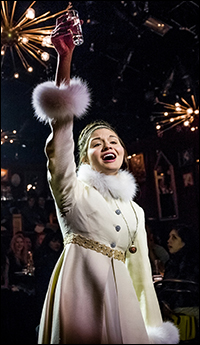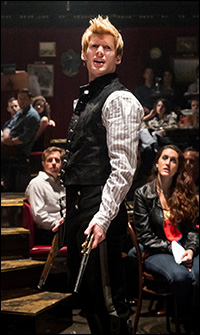
*
Natasha, Pierre and the Great Comet of 1812 [Ghostlight]
I sat down at a preview of Natasha, Pierre and the Great Comet of 1812 not knowing quite what to expect. The decor was certainly out of the ordinary, something like what the Russian Tea Room might look like if it had been transformed into a bordello 20 years back. But the tables were significantly more crammed than at the Tea Room; with strangers sharing my table and surrounding my elbows, last-minute patrons shoe-horning in, and waitstaff darting through space with trays full of vodka, conditions did not seem conducive to a warm and welcoming musical.
But then they started. A friendly, bearded fellow in wire-rim glasses who looked like anything but an actor — or an 1812 Muscovite, either — started playing a lone accordion and singing like a non-singer giving it all his worth. "There's a war going on out there somewhere, and Andrey isn't here," he sang, and repeated it. After which he was joined by the entire cast — still to that one squeezebox — repeating the phrase twice more. They all then went on to explain that this was all taken from a complicated Russian novel, where everyone has nine different names, and you should check the chart in your program if you want to keep up with the plot. They also introduced the cast, one by one, not with lengthy paragraphs but a few words each: Natasha is young, Sonya is good, Anatole is hot.
 |
||
| Phillipa Soo |
||
| photo by Chad Batka |
The Great Comet began life with a limited engagement at the 90-seat Ars Nova on the far West Side, starting in October 2012. It reconfigured itself, a half-year later, as a full commercial production for a summer run in its own, custom-made 200-seat tent on 13th Street, directly under the Highline. When that site was reclaimed for construction, they packed up the entire operation and moved it to 45th Street, next to the Imperial Theatre. They are scheduled to continue there until Jan. 5, 2014, after which — who knows? In the meanwhile, Ghostlight has released the original cast album of Natasha, Pierre and the Great Comet of 1812, both online and in a two-disc set.
I feel honor-bound to mention that I wrote the liner notes for the album — but I only did so because I like the show so much. Malloy works in a combination of styles, ranging from nouveau-techno whatever to pristine art songs. I'm not much of a techno type, but in The Great Comet it all works; the very variety of styles helps move the story along and keeps the audience hooked. Anyone who's sat through traditional costume operetta versions of "great" novels and been bored knows that things can sometimes get a little wearying.
| |
 |
|
| Lucas Steele in Natasha, Pierre and the Great Comet of 1812. | ||
| photo by Chad Batka |
[Spoiler alert: The Great Comet is only a small, relatively early slice of "War and Peace." Later in the novel, Pierre joins the Army; fails in an attempt to assassinate Napoleon; and is taken prisoner by the French. After the war, Natasha and Pierre get married and live happily ever after.]
The cast — all but one of whom I was thoroughly unfamiliar with — is outstanding. Leading the group is Phillipa Soo, who gives an altogether stunning performance as Natasha. Malloy, as noted, makes a remarkable Pierre; he left the cast shortly after the move last May, but he returned to sing the role on the recording. (He has been replaced by David Abeles, who played the recording engineer and did much of the heavy guitar work in Once.) As for Malloy, he is presently appearing in his newest work, a "philosophical musical fantasia" called Black Wizard/Blue Wizard. This is playing through Dec. 22 at the Incubator Arts Project in St. Mark's Church in the East Village. I don't know about you, but I plan to run down to see it. It sounds unusual, sure, but then so did The Great Comet.
Brittain Ashford (as Sonya) and Amber Gray (as Hélène) are both major assets, and Lucas Steele — who had been impressive as the younger father in the New Group's 2010 production of Dan Savage's The Kid — makes a perfect rake as Anatole. Or Matias, the actual music director/conductor, leads a top-notch band in Malloy's stunning and decidedly unusual-for-theatre orchestrations. Malloy seems to like to stray off pitch, cannily doing so to express his characters' state when they stray off pitch. There is even an eerie sequence accompanied by the cast rubbing their fingers across the rims of liquid-filled wine goblets.
The show, as you might have heard, has thus far been performed in Russian café-type venues which perfectly fit the show. My guess, though, is that it will eventually find its way into traditional theatre spaces — and it will continue to thrive. The milieu makes it a great "event" musical, but it is Dave Malloy's score that is The Great Comet's true strength. (Steven Suskin is author of "Show Tunes," "The Sound of Broadway Music: A Book of Orchestrators and Orchestrations," "Second Act Trouble," the "Opening Night on Broadway" books, and "The Book of Mormon: The Testament of a Broadway Musical." He also writes the Aisle View blog at The Huffington Post. He can be reached at [email protected].)


























Matthew-Murphy.jpg)

